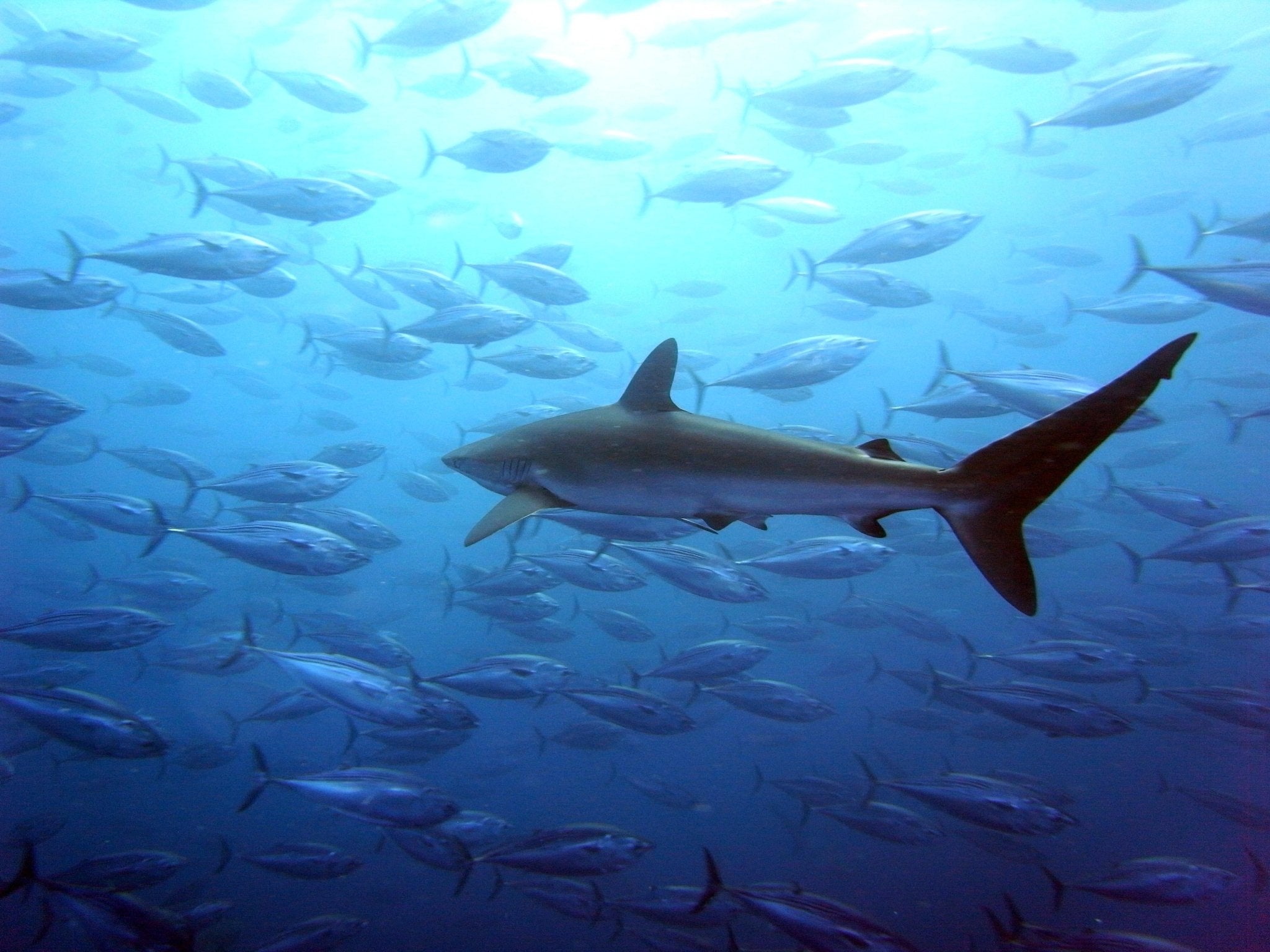As Shark Week looms ominously on the horizon, Seatopia welcomes you to traverse beneath the choppy surface of shark stereotypes, casting light on the truth about these sublime sea guardians. Forget the ferocious finned villains of the silver screen; sharks are in fact the unseen, unsung protectors of our oceanic ecosystems, whose roles resonate with a profound sense of balance and resilience.
Regrettably, a longstanding misunderstanding, fueled by sensational media portrayals, has condemned these creatures to a grim, unwarranted slaughter. The myth of the shark, painted with a brush of menace and malice, endangers their existence and destabilizes the very ecosystems they help sustain.
Why should Seatopia, a seafood business, stand as a bastion for sharks? Unseen yet pivotal, these marine behemoths form the connective tissue of our oceanic food chains. Any disturbance to their existence reverberates throughout every corner of the ocean, affecting our fish, coral reefs, kelp forests, and even the future of fishing. Our commitment to reducing bycatch, conserving shark populations, and promoting sustainable fishing practices is a testament to our dedication to the greater marine ecosystem.
Join us now as we navigate the deep blue, unmasking the invaluable role of sharks in our ecosystems, economy, and in maintaining the robust health of our oceans.

Photo by Kinga Phillips
Keystone Species: Ocean’s Equilibrium Stewards
Sharks, as keystone species, form the fulcrum upon which the balance of ecosystems pivots. These apex predators regulate the populations of subordinate species in the food chain, preying on weaker individuals, thereby fortifying the overall health of marine populations and ensuring ecological harmony. Remove sharks from this intricate equation, and one risks unleashing a domino effect that could disrupt entire ecosystems.
The Vigilant Wardens of Ocean Health
Our survival on this blue planet is inextricably linked to the health of our oceans. As top predators, sharks are stalwarts in maintaining marine life health and diversity. Their vigilant patrols help control populations and cull sick organisms before disease can wreak havoc. Sharks prevent the overgrazing of seagrass beds and coral reefs, habitats that are critical to the sustenance of marine life. Their efforts ripple out to benefit coastal communities and contribute to climate regulation.
The Economics of Ecology
Sharks wield a subtle yet significant economic influence. Healthy shark populations attract eco-tourists and shark-diving enthusiasts, pumping money into local economies. Shark tourism is a lifeblood for places like Palau, the Maldives, and the Galapagos Islands, and serves as a powerful incentive for conservation efforts. Moreover, by controlling their prey populations, sharks indirectly support sustainable fisheries management.
Medicinal Mavericks
Sharks, as ancient inhabitants of our oceans, are biological marvels. Their immune systems, refined over 400 million years, are potential treasure troves of cures for diseases, including cancer. Research on shark cartilage hints at anti-tumor properties that could transform cancer treatment. Their regenerative capabilities, exemplified in their rapid wound healing, offer promising leads for advancements in human wound care.
Cultural Icons and Ecological Envoys
Beyond their ecological functions, sharks hold a significant place in diverse cultures, symbolizing strength, power, and resilience. Their charisma sparks public imagination and bolsters marine conservation efforts. By focusing on shark conservation, we spotlight the broader challenges our oceans face, inspiring collective action to safeguard these precious ecosystems.

Photo by James Arthur Smith
The survival of our shark populations hangs in a precarious balance. The confluence of climate change, habitat destruction, and especially overfishing—both accidental and intentional—threatens to upset this balance. Practices such as finning—removing fins and discarding the bodies—result in vast quantities of waste and put unsustainable pressure on these slow-reproducing creatures.
Shark catches by fisheries are estimated to be three to four times higher than reported due to unregulated activities and misidentification. When short-term economic value trumps long-term conservation, we risk triggering a catastrophic fisheries collapse and potentially global extinction.
Let's remember, these custodians of the ocean are instrumental in maintaining the health and balance of marine ecosystems. Their conservation is paramount not only for their survival but also for the well-being of our planet. By safeguarding sharks, we ensure the preservation of marine biodiversity for future generations.
Your role in this journey is critical. By choosing Seatopia, you stand up against destructive commercial fishing practices that harm shark populations worldwide. You support local farms and aquaculture partners committed to sustainable fishing practices, thereby allowing sharks to fulfill their crucial roles in the ocean, our planet's largest ecosystem.
One of the organizations we deeply admire and support is Shark Allies https://sharkallies.org/, a nonprofit dedicated to protecting sharks. They began their groundbreaking legislative work in 2010, developing the world's first shark fin trade ban in Hawaii—a remarkable achievement that set the stage for similar bans on elephant ivory and rhino horn trading. Their founder, Stefanie Brendl, collaborated directly with Hawaii State Senator Clayton Hee to prohibit the sale, trade, and possession of shark fins.
Following the success in Hawaii, Shark Allies, in partnership with other organizations such as HSUS, Pew, Shark Savers, and WildAid, championed a wave of legislation to stop the fin trade and establish shark sanctuaries. The movement sparked by the Hawaii bill has led to 14 US States, three territories, and numerous Pacific Nations passing fin trade bans, with several states currently shaping similar legislation.
In 2020 and 2021, their Stop the Fin Trade campaign succeeded in banning the shark fin trade in Florida, a significant victory after three years of relentless efforts. This success was pivotal in the passage of the Federal Fin Elimination Act in December 2022, which led to a nationwide ban on the sale and trade of shark fins in the United States.
With every Seatopia order, we pledge to sow a kelp plant back into the ocean. This isn't just a symbolic gesture. These underwater forests are not only carbon sinks, combating climate change, but also vital habitats for a myriad of marine creatures, including various shark species such as leopard sharks, spiny dogfish, and horn sharks.

The rejuvenation of these kelp forests offers shelter and abundant prey for sharks, while providing a safe haven for juvenile sharks, away from the threat of larger predators. Your choice to dine with Seatopia aids in the conservation of these magnificent creatures, directly contributing to the regeneration of their habitats and the revitalization of our oceans.
Our commitment to kelp reforestation is twofold: it’s an investment in the planet's health and a promise to the continued survival of shark species that rely on these habitats. Indulge in the ocean's bounty, knowing that your meal contributes to a more sustainable, resilient marine ecosystem, and supports the inspiring work of organizations like Shark Allies. Together, we can ensure the prosperity of our oceans and the diverse life they nurture for generations to come.
Stay tuned for part 2 - an interview with Shark Week host Kinga Phillips!











Share:
Navigating an Ocean of Information: A Comprehensive Guide to Mercury Detox and Safe Seafood Consumption
Elevate Your Sushi Experience with Yugeta Shoyu: A Soy Sauce Unlike Any Other